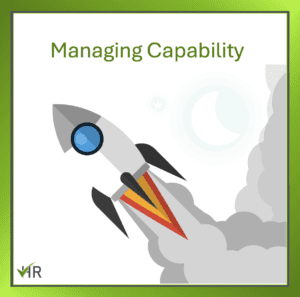Managing Capability in the Workplace
Managing employee capability is crucial for organisations to thrive. Capability management involves identifying, developing, and maximising the skills, knowledge, and potential of employees to drive performance and achieve business objectives.
key principles and strategies for effectively managing capability in the workplace.
Assessing Capability:
The first step in managing capability is assessing the current skills and competencies of employees. This can be done through performance evaluations, skills assessments, and feedback mechanisms. By understanding the strengths and development areas of each employee, managers can tailor development plans to meet their specific needs.
Clear Performance Expectations:
Setting clear performance expectations is essential for managing capability. Employees should have a clear understanding of what is expected of them in terms of job responsibilities, targets, and performance standards. By aligning individual goals with organisational objectives, employees can focus their development efforts on areas that contribute most to the company’s success.
Individual Development Plans:
Once capability gaps are identified, managers should collaborate with employees to create individual development plans (IDPs). These plans outline specific goals, actions, and timelines for enhancing skills and knowledge. IDPs may include on-the-job training, formal education, mentorship programs, or job rotations. Regular progress reviews and feedback sessions help track development and make necessary adjustments.
Training and Development Programs:
Organisations should invest in training and development programs to enhance employee capability. These programs can take various forms, such as workshops, seminars, e-learning modules, and conferences. By providing employees with access to relevant and up-to-date training opportunities, organisations empower them to acquire new skills and stay ahead in a rapidly evolving business landscape.
Coaching and Mentoring:
Coaching and mentoring play a vital role in managing capability. Experienced managers or senior employees can serve as coaches or mentors to guide and support the development of their team members. Through regular feedback, constructive guidance, and sharing of industry insights, coaches and mentors help employees build their skills, confidence, and overall capability.
Performance Feedback and Recognition:
Regular performance feedback is essential for managing capability effectively. Managers should provide constructive feedback to employees, acknowledging their strengths and identifying areas for improvement. Timely recognition and rewards for achievements further motivate employees to enhance their capabilities and excel in their roles.
Succession Planning:
Managing capability also involves long-term workforce planning. Organisations should identify high-potential employees and create succession plans to develop and prepare them for future leadership positions. Succession planning ensures a pipeline of capable individuals who can assume critical roles when needed, minimising disruptions and enabling smooth organisational transitions.
Promoting a Learning Culture:
Creating a learning culture is fundamental to managing capability. Organisations should foster an environment that encourages continuous learning, knowledge sharing, and innovation. This can be achieved through platforms for sharing best practices, cross-functional collaborations, internal knowledge repositories, and opportunities for professional growth.
Performance Management Systems:
Effective performance management systems are vital for managing capability. These systems provide mechanisms to track and evaluate employee performance, identify development needs, and align performance outcomes with organisational goals. Regular performance reviews, goal setting, and ongoing feedback help employees stay motivated and focused on their development.
Embracing Technology:
Leveraging technology can greatly enhance capability management efforts. Learning management systems, talent management platforms, and performance management software enable efficient tracking of employee development, facilitate knowledge sharing, and provide analytics for data-driven decision-making.
Managing capability in the workplace is a continuous process that requires strategic planning, investment, and a supportive organisational culture.
Want to find out more? Drop us an email or give us a call.
07745 535 635

